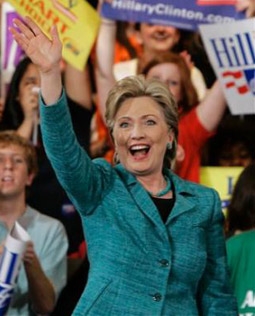


Hillary Clinton clinched a much needed win in Tuesday’s Pennsylvania primary election. The longevity of her campaign was dependent upon her performance in this latest election. Political analysts expected Hillary Clinton to secure the win, but the margin of victory was impossible to predict.

Being a state with a large population of Catholics and older citizens, Pennsylvania gave Clinton the advantage in this competition. Her core supporters populated the majority of this state. Just as occurred in the Ohio primary, working-class voters, along with white men and women boosted the New York Senator to a decisive victory. Barack Obama secured votes from younger voters, college educated citizens, and African Americans. It became evident once the results started coming in that there was a clear age, gender and race division.

There was heavy voter turnout from Pittsburg and various other industrial counties throughout the state of Pennsylvania, which was the base for Hillary Clinton’s success. She did well in Scranton which was her father’s hometown, as well as a heavily unionized area. The majority of women backed Hillary Clinton, with 57% to Obama’s 43% of the female vote. Hillary Clinton also received 61% of votes from those aged 65 and older.

Barack Obama relied on the Philadelphia region of Pennsylvania to rack up votes, Philadelphia being an area that is heavily comprised of African Americans. However, being a state where the black vote made up a miniscule 14% of voters, while the white vote made up 80%, it was apparent that Barack Obama was facing an uphill battle.
Winning by 10 points, Hillary Clinton’s margin of victory was impressive. It was essential for her to pull out ahead in this primary election by a considerable amount of votes. She managed to narrow the gap between herself and Barack Obama by adding more than 200,000 popular votes, along with 75 pledged delegates. The momentum gained from this win will be helpful to convince fundraisers to put their faith in her, while at the same time planting seeds of doubt about the viability of Barack Obama.
Obama outspent his opponent 3-to-1 by using $11 million for 10,000 ads in the state of Pennsylvania. Despite having such a considerable financial edge, he was still not able to secure the blue-collar vote. Hillary Clinton will argue that Barack Obama’s failure to win among the working class indicates that he will not be successful against John McCain if he were to go up against him in November’s general election. She will influence the voters by indicating that she is more electable. She may also compare Barack Obama to Michael Dukakis.
In 1988, Dukakis was unable to get the support of the working class in the eastern and western counties in Pennsylvania. As a result, the former Democratic Massachusetts Governor lost to former President George H.W. Bush in Pennsylvania, and did not go on to win the Presidential election.
The divide in the Democratic Party is increasingly becoming more prevalent as this race continues to go forward. A Gallup Poll indicated that 28% of Hillary Clinton supporters will vote Republican if she does not get the Democratic nomination. This percentage has increased over the past couple of months. The split among voters is detrimental to the Democratic Party and Hillary Clinton is well aware of this. She is in a position to persuade the remaining superdelegates.
After dealing with the Reverend Jeremiah Wright’s controversial ideas and the “bitter” controversy in the past couple of months, Barack Obama is ready to repair his campaign. He is already looking ahead to the next set of elections in Indiana and North Carolina.
Since neither candidate will be able to secure the required 2,025 delegates needed to win the Democratic nomination, the superdelegates will likely have to decide the nominee at the convention in August. Watching Hillary Clinton gain momentum after the Pennsylvania primary has merely prolonged this decision for many of these decision making voters.
